中考必备:语文阅读理解精选50篇22
2023届中考语文阅读理解50篇(含答案)
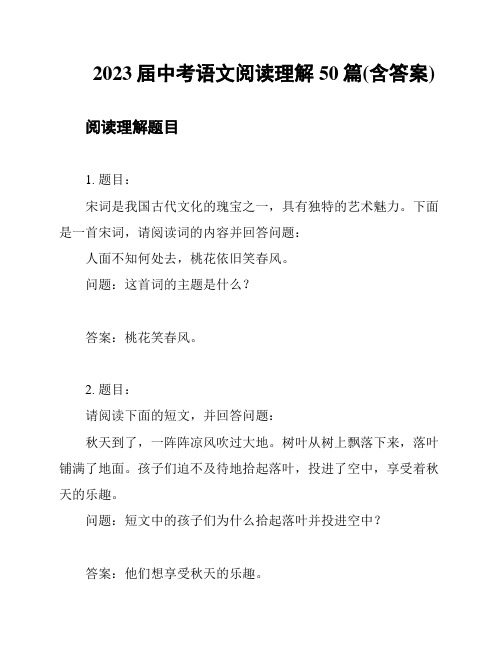
2023届中考语文阅读理解50篇(含答案)阅读理解题目1. 题目:宋词是我国古代文化的瑰宝之一,具有独特的艺术魅力。
下面是一首宋词,请阅读词的内容并回答问题:人面不知何处去,桃花依旧笑春风。
问题:这首词的主题是什么?答案:桃花笑春风。
2. 题目:请阅读下面的短文,并回答问题:秋天到了,一阵阵凉风吹过大地。
树叶从树上飘落下来,落叶铺满了地面。
孩子们迫不及待地拾起落叶,投进了空中,享受着秋天的乐趣。
问题:短文中的孩子们为什么拾起落叶并投进空中?答案:他们想享受秋天的乐趣。
3. 题目:阅读下面的内容,并回答问题:小明的爱好是玩乐高积木,他可以花很多时间搭建各种有趣的模型。
他喜欢动手,也喜欢思考如何组装。
小明相信通过玩乐高积木,他可以培养自己的创造力和空间想象力。
问题:小明为什么喜欢玩乐高积木?答案:他相信可以培养自己的创造力和空间想象力。
4. 题目:阅读下面的短文,并回答问题:高山上的空气清新宜人,森林中的鸟儿欢快地歌唱着。
小明来到了这个美丽的地方,他感受到了大自然的魅力,也学到了很多新知识。
他观察了不同种类的植物和动物,学会了如何爱护环境。
问题:小明通过来到高山上的体验学到了什么?答案:他学会了如何爱护环境。
5. 题目:阅读下面的内容,并回答问题:星期六是小明最喜欢的一天。
他可以和小伙伴们一起去公园玩耍,可以放风筝、骑自行车、吹泡泡。
他们度过了一个快乐的下午。
问题:星期六是小明最喜欢的一天吗?答案:是。
...50. 题目:阅读下面的内容,并回答问题:为了保护环境,小明主动参加了环境保护志愿者活动。
他和其他志愿者一起清理了公园内的垃圾,同时也给人们发放了环保手册,让大家了解环境保护的重要性。
问题:小明为什么要参加环境保护志愿者活动?答案:为了保护环境,让大家了解环境保护的重要性。
参考答案1. 桃花笑春风。
2. 他们想享受秋天的乐趣。
3. 他相信可以培养自己的创造力和空间想象力。
4. 他学会了如何爱护环境。
精选中考阅读理解30篇(附答案)
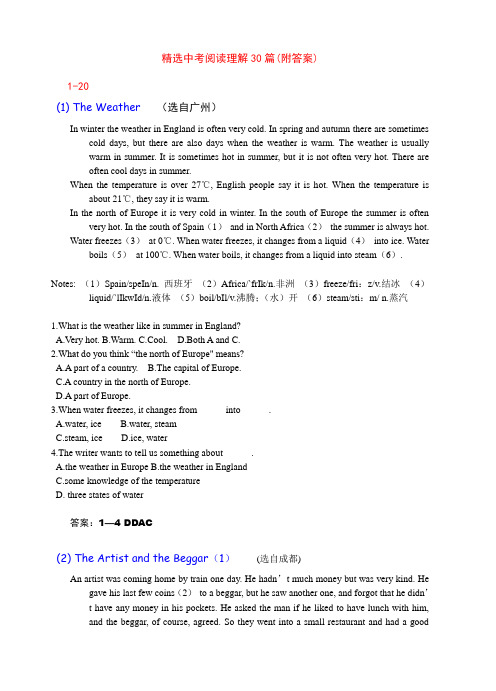
精选中考阅读理解30篇(附答案)1-20(1) The Weather (选自广州)In winter the weather in England is often very cold. In spring and autumn there are sometimes cold days, but there are also days when the weather is warm. The weather is usuallywarm in summer. It is sometimes hot in summer, but it is not often very hot. There areoften cool days in summer.When the temperature is over 27℃, English people say it is hot. When the temperature is about 21℃, they say it is warm.In the north of Europe it is very cold in winter. In the south of Europe the summer is often very hot. In the south of Spain(1)and in North Africa(2)the summer is always hot.Water freezes(3)at 0℃. When water freezes, it changes from a liquid(4)into ice. Water boils(5)at 100℃. When water boils, it changes from a liquid into steam(6).Notes: (1)Spain/speIn/n. 西班牙(2)Africa/`frIk/n.非洲(3)freeze/fri:z/v.结冰(4)liquid/`lIkwId/n.液体(5)boil/bIl/v.沸腾;(水)开(6)steam/sti:m/ n.蒸汽1.What is the weather like in summer in England?A.Very hot.B.Warm.C.Cool.D.Both A and C.2.What do you think “the north of Europe" means?A.A part of a country.B.The capital of Europe.C.A country in the north of Europe.D.A part of Europe.3.When water freezes, it changes from into.A.water, iceB.water, steamC.steam, iceD.ice, water4.The writer wants to tell us something about.A.the weather in EuropeB.the weather in EnglandC.some knowledge of the temperatureD. three states of water答案:1—4 DDAC(2) The Artist and the Beggar(1)(选自成都)An artist was coming home by train one day. He hadn’t much money but was very kind. He gave his last few coins(2)to a beggar, but he saw another one, and forgot that he didn’t have any money in his pockets. He asked the man if he liked to have lunch with him,and the beggar, of course, agreed. So they went into a small restaurant and had a goodmeal.In the end, the artist could not pay the bill(3), and the beggar had to do so. The artist felt very sorry for it, so he said to the beggar, “Come home with me in a taxi, my friend. And I’ll give you the money for our lunch."“Oh, no!" the beggar answered quickly. “I had to pay for your lunch, but I‟m not going to pay for your taxi home!"Notes: (1)beggar/`beg/ n.乞丐(2)coin/kIn/n. 硬币(3)bill /bIl/n.帐单1.What kind of man was the artist?2.What did he do to the first beggar?3.What did the artist forget when he invited another beggar to have lunch with him?4.Who paid for the meal?5.What did the artist want to do at last?6.Why didn’t the beggar go home with the artist?答案:1.The artist is a kind man.2.He gave his last few coins to the first beggar.3.He forgot that he had no money then.4.The beggar paid for the bill.5.He wanted to return the beggar the money when he got home.6.Because he wouldn’t pay for the taxi.(3) A Common Language (选自陇南)There is a common(1)language popular in every country in the world. All the people, old and young, men and women, must use it.It’s everybody’s second language. It’s easy to learn, though(2)you don’t hear it. It’s sign language(3).When you wave to a friend, you are using sign language. When you smile at someone, you mean to be friendly. When you put up your hand in class, you are saying, “Please ask me.I know the correct answer." When you put your finger in front of your mouth, you mean“Be quiet." The deaf use sign language to talk to each other. There is even a universityfor the deaf in the United States. There are also TV programmes for the deaf people.They use sign language to tell everybody.Notes: (1)common/`kmn/adj. 共同的(2)though/u/ conj. 尽管(3)sign language 手势语(4)wave/weIv/ v. 挥手1.E uses sign language.2.Sign language is not d, so we can learn it.3.Most people who can s use sign language, too.4.If someone smiles at you, it means he/she is friendly t you.5.If you can a a question, you should put up your hand first.6.You put your finger in front of your mouth if you want someone not to s anything.7.The deaf can talk to each other w sign language.8.Some A deaf people can learn sign language in the university.答案:1.Everyone 2.difficult 3.speak 4.to 5.answer 6.say 7.with 8.American(4) Tom Broke a Plate or a Gold Watch? (选自辽宁)It was Sunday and Tom was staying at home. After breakfast he went out into the garden and played quietly by himself. There were no kids around and he was used to(1)playing alone quietly. He played with Bobby, the dog. He climbed up and down the tree.Sometimes a bird would come down to perch(2)on top of the doghouse. Then Tom would have the greatest fun(3)by throwing a stone or something at it. Though he never made it, he did like doing this kind of thing.Now Tom had been in the garden for half an hour. Suddenly a crack(4)was heard and the little boy began crying.“What’s the matter,Tom?"his mother looked through the kitchen(5)window. Tom ran into the kitchen.“Mum," he sobbed(6). "I broke Bobby’s plate. I didn’t know it was so fragile(7)."His mother put her arms round him and said, “Don’t feel so sad, Tom. We have other plates for Bobby. But how did you break that one?"“I threw it at a bird but missed, and it went straight to the plate."In Tom’s hand was his father’s gold pocket watch(8)!Notes: (1)be used to 习惯于(2)perch/p:t/n. 停歇(3)fun/fn/n. 爱好(4)crack /crk/n. 破碎声(5)kitchen/`kItn/n. 厨房(6)sob/sb/v. 抽泣(7)fragile/`frdaIl/adj.易碎的(8)gold pocket watch 金怀表1.When did the story happen?A.On a Sunday afternoon.B.On a Sunday morning.C.At noon.D.In the evening.2.When a bird perched on top of the doghouse,Tom.A.would like to play with itB.was very interested in it by throwing a stone at itC.would like to give it something to eatD.would smile3.There were no kids around and he was used to playing alone quietly. Here“kids" means.A.menB.dogsC.childrenD.birds4.How long had Tom been in the garden when his mother heard him cry?A.An hour.B.A day.C.Two hours.D.Half an hour.5.“Though he never made it" means“".A.Though he couldn‟t hit a bird with a stone or somethingB.Though he couldn‟t catch the birdC.Though he couldn‟t have fun from the birdD.Though he couldn‟t eat the bird答案:1—5 BBCDA(5) EatingAn important question about eating out is who pays for the meal. If a friend of yours asks you to have lunch with him, you may say something like this,“I’m afraid it’ll have to be someplace cheap, as I have very little money." The other person may say,“O K, I‟ll meet you at McDonald‟s."This means that the two agree to go Dutch, that is, each person pays for himself. He may also say,“Oh, no. I want to take you to lunch at Smith’s," or“I want you to try the Chinese dumplings there. They’re great." This means the person wants to pay for both of you. If you feel friendly towards this person, you can go with him and you needn‟t pay for themeal. You may just say,“Thank you. That would be very nice."American customs(1)about who pays for dates(2)are much the same as in other parts of the world. In the old days, American women wanted men to pay for all the meals. But,today, a university(3)girl or a woman in business world will usually pay her way during the day. If a man asks her for a dance outside the working hours, it means“Come, as my guest(4).”So as you can see, it is a polite thing to make the question clear at the very beginning.Notes:(1)custom/`kstm/n. 风俗(2)date/deIt/n.约会(3)university/、ju:nI`v:sItI/n.大学(4)guest/gest/n. 客人1.The passage tells us.A.how to eat outB.where to eat outC.what to eat outD.who pays for the meal2.If you have little money,.A.you‟ll have a cheap mealB.you‟ll borrow some from othersC.you‟ll ask your friend to pay for your mealD.you won‟t want your friends to ask you to dinner3.“Go Dutch" in this passage means.A.去饭馆B.就餐C.订餐D.各自付款4.Sometimes your friend takes you to lunch. It means.A.he‟s going to lend some money to youB.he‟s going to pay for your meal, tooC.he‟ll be angry with youD.he can‟t understand you5.In America,some girls and women now.A.ask men to pay for their mealsB.try to pay for the men‟s mealsC.try to pay for their own mealsD.never have anything outside答案:1—5 DADBC阅读理解(6)Most children like watching TV.It’s very interesting.By(1)watching TV they can see and learn a lot and know many things about their country and the world.Of course,they canalso learn over the radio.But they can learn better and more easily with TV.Why?Because they can hear and watch at the same time.But they can‟t see anything over the radio.TV helps to open children’s helps to open their minds(2),too.They learn newer and better ways of doing things.They may find the world is now smaller than before.Many children watch TV only on Saturday or Sunday evening.They are always busy with their lessons.But a few children watch TV every night.They go to bed very late.Theycan’t have a good rest.How about you,my young friends?Notes:(1)by/baI/prep.通过(2)minds/maIndz/n.智力1.A few children go to bed late because they.A.are busy with their lessonsB.do their homeworkC.watch TVD.listen to the radio2.Children can’t see anything.A.in the radioB.on the radioC.on TVD.by watching TV helps to open children’s.A.eyes and mindsB.mindsC.eyes or mindsD.eyes4.children watch TV only on Saturday or Sunday evening.A.A lotB.MuchC. A lot ofD.A little5.Children can study better and more easily with TV because.A.they like to watch TVB.they can hear at the same timeC.they can watch at the same timeD.they can listen to and see something at the same time参考答案:1.C 2.B 3.A 4.C 5.D阅读理解(7)John was ten years old and he was very lazy[1].He had to go to school,of course,but he was bored[2]there and tried to do as little work as possible.His father and mother were bothdoctors and they hoped that he would become one,too,when he grew up.But one day John said to his mother,“When I finish school, I want to become a garbage collector[3].”“A garbage collector?”his mother asked .She was very surprised.“That’s not a pleasant job.Why do you want to become a garbage collector?”“Because then I’d only have to work one day a week,”John answered.“Only one day a week?”his mother said,“What do you mean?”“Well,”John answered,“I know that the ones who come to our house only work on Wednesday,because I only saw them on that day.”Notes:[1]lazy/leIzI/adj.懒的[2]bored/bd/adj.厌烦[3]garbage collector 垃圾工1.John at school.A.didn’t do any workB.did much workC.did very little workD.tried to finish his work2.John’s parents wanted him to become.A.a garbage collectorB.a doctorC.a teacherD.a worker3.John hoped to be a garbage collector because.A.he knew it was an important and necessary jobB.he thought he would work only one day a weekC.he often saw some garbage collectors come to his houseD.the garbage collectors really work only one day a week4.John thought that the garbage collectors only work one day a week because.A.it was a ruleB.some garbage collectors told him soC.his parents told him soD.he saw them work only on Wednesday参考答案:1.C 2.B 3.B 4.D阅读理解(8)Bill and Fred studied at a university and they were friends. They didn’t have much money, so when it was time for their holidays, Fred said, “Let’s take our holidays in a trailer[1], Bill. It’s cheaper than a hotel. I can borrow my father’s trailer.”Fred was very happy. So they got into the trailer and began their holidays. They wanted to get up early the next day to go fishing, but they didn’t have an alarm[1] clock.“That’s all right, Bill," Fred said. “I’ll put these pieces of bread on the roof[3] of the trailer tonight and they’ll wake us up in the morning." Bill was very surprised, but he didn’t say anything.Fred was right. As soon as it began to get light, small birds came down to eat the bread, and their noise on the roof of the trailer woke Bill and Fred up very quickly.Notes:[1]trailer/`treIl/ n. 活动房屋式的拖车[2]alarm/`la:m/ n. 警报alarm clock 闹钟[3]roof/ru:f/ n. 顶;房顶1.Bill and Fred were both university s.2.The two young men decided to go t during their summer holidays.3.The two young men tried to s some money,so they borrowed a trailer.4.The two young men wanted to get up, but they were a to wake up too late the nextmorning.5.Fred had a good i.6.Bill didn’t know w his friend put some bread on the top of the trailer.7.The next morning, the birds found the bread and flew to e it.8.In fact, the b woke the two young men up.9.The birds began to look for f as soon as it got light.10.Fred was very c.参考答案:1.students 2.traveling 3.save 4.afraid 5.idea 6.why 7.eat 8.birds 9.food 10.clever阅读理解(9)Some children think writers are great and they can tell people a lot. So they also wish to be writers some day. They mean that they want to write stories or books which manypersons will read. I would like to remind[1] them that they will need to be good readersand to read a lot in order to[2] be good writers.Nearly all great writers read too long before they started to school, and read for hours and hours every day since they became good readers. Instead of watching TV in the evening,they spend much of their spare[3] time reading books.If you are a good reader, it won’t take you long to do the reading homework your teacher asks you to do. Then you will have time to read other books for fun. Because you read so well, you keep looking for more books to read.While making up your mind[4] to become a good writer, you had better say to yourself,“I must read more and more if I am really to become a good writer."Notes:[1]remind/rI`maInd/v. 提醒[2]in order to 为了[3]spare /spe/adj. 多余的[4]make up one’s mind 下决心1.Some of the children like the g writers.2.The writer told the children to read m before they hope to be writers.3.A lot of writers l a lot from other writers' books and stories.4.For a student, he or she should do the reading homework well f.5.Doing much good reading can h you to be a good writer.参考答案:1.great 2.more 3.learned 4.first 5.help阅读理解(10)Australia is one of the greatest islands in the world.It is a little smaller than China.It is in the south of the earth.So when there is hot summer in our country,it is cold winter inAustralia.Australia is big,but the population[1] has small.The population of Australia is the same as that of Shanghai,a city in China.Australia is famous for its sheep and kangaroos[2].After a short drive from any town,you will find yourself in the middle of white sheep,sheep,sheep,everywhere are sheep.Have youseen a kangaroo?It has a “bag”in its body.The mother kangaroo keeps its babykangaroo in the “bag”.It is very interesting,isn‟t it?Notes:[1]population /、ppjuleIn/n.人口[2]kangaros /、kg`ru:/n.袋鼠根据短文内容判断正(√)、误(×)。
中考课外文言文阅读24篇(含答案)

中考课外文言文阅读24篇(含答案)中考课外文言文阅读24篇(一)文征明习字《书林纪事》【原文】文征明临写《千字文》,日以十本为率,书遂大进。
平生于书,未尝苟且,或答人简札,少不当意,必再三易之不厌,故愈老而愈益精妙。
【译文】文征明监贴写《文字文》,每天以写十本作为标准,书法就迅速进步起来。
他平生对于写字,从来也不马虎草率。
有时给人回信,稍微有一点不全意,一定三番五次改写过它,不怕麻烦。
因此他的书法越到老年,越发精致美好。
【阅读训练】1.解释下面句中加点的词①书遂大进②平生于书③文征明临写《千字文》④或答人简札①书法②写字③临摹④有时2.将“少不当意,必再三易之不厌”译成现代汉语。
译文:稍微不称心,必定再三地更改它而不感到厌倦。
3.用一句话来概括这段文字的中心。
答:本段文字赞扬了文明学习书法认真,一丝不苟的精神。
(二)薛谭学讴【原文】薛谭学讴于秦青,未穷青之技,自谓尽之,遂辞归。
秦青弗止,饯行于郊衢,抚节悲歌,声振林木,响遏行云。
薛谭乃射求反,终身不敢言归。
【译文】薛谭向秦青学习唱歌,还没有学完秦青的技艺,就以为学尽了,于是就告辞回家。
秦青没有劝阻他,在城外大道旁给他饯行,秦青打着拍节,高唱悲歌。
歌声振动了林木,那音响止住了行云。
薛谭于是向秦青道歉,要求回来继续学习。
从此以后,他一辈子也不敢再说要回家。
【阅读训练】1.解释下列加点的词在文中的意思。
①秦青弗止。
②响遏行云。
(①不,没有②阻止)2.对下列各句中加点用法、意义判断不正确的一项是( D )A.①与②相同,③与④不同 B.①与②不同,③与④相同C.①与②相同,③与④也相同 D.①与②不同,③与④也不同3.翻译:谭乃高压求反。
译文:薛谭于是(向秦青)道歉,要求回来(继续学习)。
4.这个故事给你以怎样的启示?答:5.薛谭身上有无可取之处?如果有,是什么?答:有。
是他那知错能改,变骄傲为虚心的态度。
(三)范仲淹有志于天下【原文】范仲淹二岁而孤,家贫无依。
初中语文复习资料-中考必备:语文阅读理解精选50篇
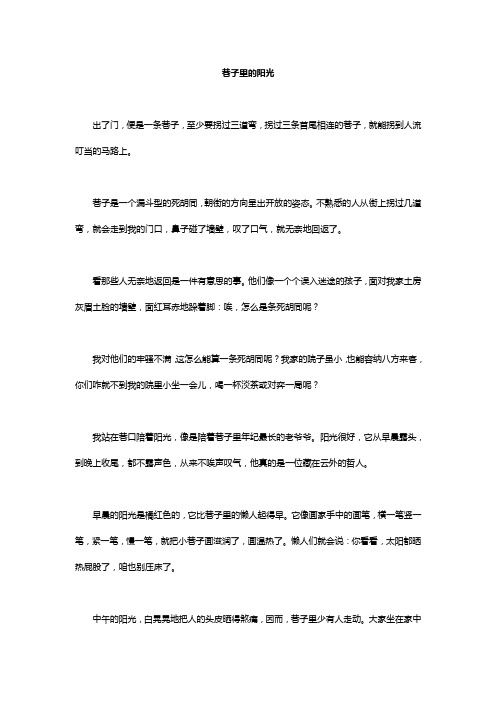
巷子里的阳光出了门,便是一条巷子,至少要拐过三道弯,拐过三条首尾相连的巷子,就能拐到人流叮当的马路上。
巷子是一个漏斗型的死胡同,朝街的方向呈出开放的姿态。
不熟悉的人从街上拐过几道弯,就会走到我的门口,鼻子碰了墙壁,叹了口气,就无奈地回返了。
看那些人无奈地返回是一件有意思的事。
他们像一个个误入迷途的孩子,面对我家土房灰眉土脸的墙壁,面红耳赤地跺着脚:唉,怎么是条死胡同呢?我对他们的牢骚不满,这怎么能算一条死胡同呢?我家的院子虽小,也能容纳八方来客,你们咋就不到我的院里小坐一会儿,喝一杯淡茶或对弈一局呢?我站在巷口陪着阳光,像是陪着巷子里年纪最长的老爷爷。
阳光很好,它从早晨露头,到晚上收尾,都不露声色,从来不唉声叹气,他真的是一位藏在云外的哲人。
早晨的阳光是橘红色的,它比巷子里的懒人起得早。
它像画家手中的画笔,横一笔竖一笔,紧一笔,慢一笔,就把小巷子画滋润了,画温热了。
懒人们就会说:你看看,太阳都晒热屁股了,咱也别压床了。
中午的阳光,白晃晃地把人的头皮晒得煞痛,因而,巷子里少有人走动。
大家坐在家中饮茶,或睡午觉。
心里想:就让太阳发泄一会儿吧,它也有委屈焦躁的时候,过一阵子就好啦。
果不其然,一捱过下午2点,太阳就似做错事的孩子羞答起来。
它把阳光一缕又一缕,像是撒豆子一般轻轻撒进小巷,投在人的头顶上,非常轻,恐怕在人们头顶上砸出了包。
被阳光砸到滋味很受用,像是被灵巧的小狗舔了一下,暖暖的,就是说不出来。
傍晚的阳光是有诗意的。
傍晚的阳光最温柔,最贴人了。
你抓它,捏它,碰它,它一点也不急,你亮开嗓门咋唬它,它也不恼,当然,很少有这样二板吊子,就像很少有这样的恶丈夫,面对如花似玉、善解人意的爱妻,你舍得动她一指头吗?太阳也有累的时候,一天了,它要回到山谷里的床上睡大觉了。
夕阳一片深红,它把整条巷子都映得红彤彤的,大家该洗菜的去洗菜,该洗衣的去洗衣,巷口的棋摊上,依然是那些七嘴八舌爱支招儿的棋痴,但大家都已感到了太阳的惜别。
(最新)中考现代文阅读真题有答案共20篇
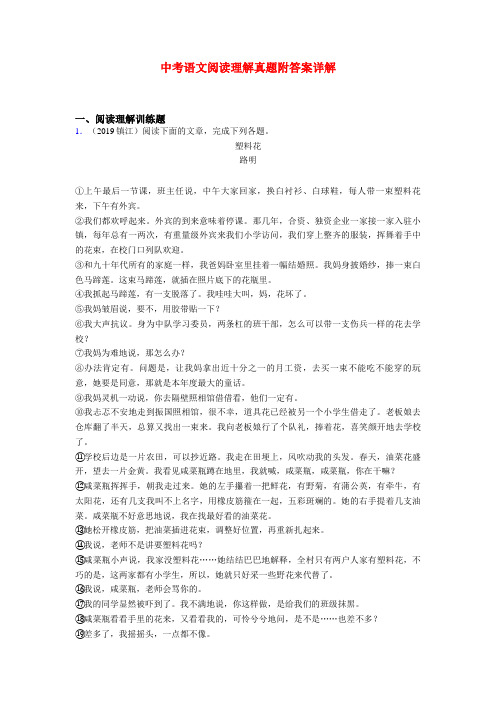
中考语文阅读理解真题附答案详解一、阅读理解训练题1.(2019镇江)阅读下面的文章,完成下列各题。
塑料花路明①上午最后一节课,班主任说,中午大家回家,换白衬衫、白球鞋,每人带一束塑料花来,下午有外宾。
②我们都欢呼起来。
外宾的到来意味着停课。
那几年,合资、独资企业一家接一家入驻小镇,每年总有一两次,有重量级外宾来我们小学访问,我们穿上整齐的服装,挥舞着手中的花束,在校门口列队欢迎。
③和九十年代所有的家庭一样,我爸妈卧室里挂着一幅结婚照。
我妈身披婚纱,捧一束白色马蹄莲。
这束马蹄莲,就插在照片底下的花瓶里。
④我抓起马蹄莲,有一支脱落了。
我哇哇大叫,妈,花坏了。
⑤我妈皱眉说,要不,用胶带贴一下?⑥我大声抗议。
身为中队学习委员,两条杠的班干部,怎么可以带一支伤兵一样的花去学校?⑦我妈为难地说,那怎么办?⑧办法肯定有。
问题是,让我妈拿出近十分之一的月工资,去买一束不能吃不能穿的玩意,她要是同意,那就是本年度最大的童话。
⑨我妈灵机一动说,你去隔壁照相馆借借看,他们一定有。
⑩我忐忑不安地走到振国照相馆,很不幸,道具花已经被另一个小学生借走了。
老板娘去仓库翻了半天,总算又找出一束来。
我向老板娘行了个队礼,捧着花,喜笑颜开地去学校了。
⑪学校后边是一片农田,可以抄近路。
我走在田埂上,风吹动我的头发。
春天,油菜花盛开,望去一片金黄。
我看见咸菜瓶蹲在地里,我就喊,咸菜瓶,咸菜瓶,你在干嘛?⑫咸菜瓶挥挥手,朝我走过来。
她的左手攥着一把鲜花,有野菊,有蒲公英,有牵牛,有太阳花,还有几支我叫不上名字,用橡皮筋箍在一起,五彩斑斓的。
她的右手提着几支油菜。
咸菜瓶不好意思地说,我在找最好看的油菜花。
⑬她松开橡皮筋,把油菜插进花束,调整好位置,再重新扎起来。
⑭我说,老师不是讲要塑料花吗?⑮咸菜瓶小声说,我家没塑料花……她结结巴巴地解释,全村只有两户人家有塑料花,不巧的是,这两家都有小学生,所以,她就只好采一些野花来代替了。
⑯我说,咸菜瓶,老师会骂你的。
中考必备:语文阅读理解精选50篇
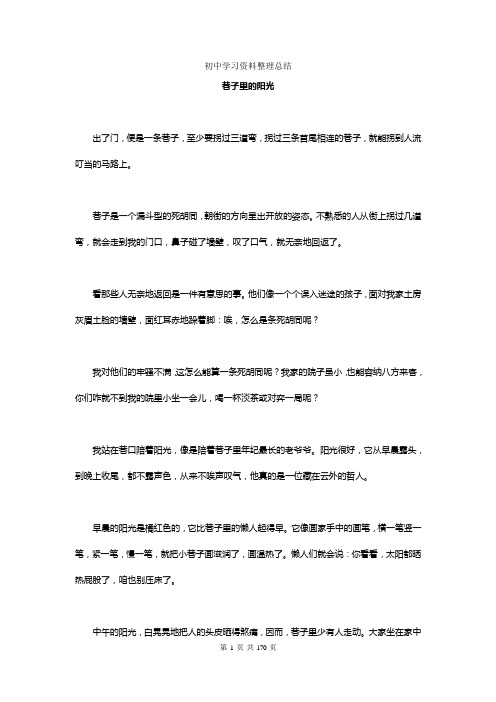
初中学习资料整理总结巷子里的阳光出了门,便是一条巷子,至少要拐过三道弯,拐过三条首尾相连的巷子,就能拐到人流叮当的马路上。
巷子是一个漏斗型的死胡同,朝街的方向呈出开放的姿态。
不熟悉的人从街上拐过几道弯,就会走到我的门口,鼻子碰了墙壁,叹了口气,就无奈地回返了。
看那些人无奈地返回是一件有意思的事。
他们像一个个误入迷途的孩子,面对我家土房灰眉土脸的墙壁,面红耳赤地跺着脚:唉,怎么是条死胡同呢?我对他们的牢骚不满,这怎么能算一条死胡同呢?我家的院子虽小,也能容纳八方来客,你们咋就不到我的院里小坐一会儿,喝一杯淡茶或对弈一局呢?我站在巷口陪着阳光,像是陪着巷子里年纪最长的老爷爷。
阳光很好,它从早晨露头,到晚上收尾,都不露声色,从来不唉声叹气,他真的是一位藏在云外的哲人。
早晨的阳光是橘红色的,它比巷子里的懒人起得早。
它像画家手中的画笔,横一笔竖一笔,紧一笔,慢一笔,就把小巷子画滋润了,画温热了。
懒人们就会说:你看看,太阳都晒热屁股了,咱也别压床了。
中午的阳光,白晃晃地把人的头皮晒得煞痛,因而,巷子里少有人走动。
大家坐在家中饮茶,或睡午觉。
心里想:就让太阳发泄一会儿吧,它也有委屈焦躁的时候,过一阵子就好啦。
果不其然,一捱过下午2点,太阳就似做错事的孩子羞答起来。
它把阳光一缕又一缕,像是撒豆子一般轻轻撒进小巷,投在人的头顶上,非常轻,恐怕在人们头顶上砸出了包。
被阳光砸到滋味很受用,像是被灵巧的小狗舔了一下,暖暖的,就是说不出来。
傍晚的阳光是有诗意的。
傍晚的阳光最温柔,最贴人了。
你抓它,捏它,碰它,它一点也不急,你亮开嗓门咋唬它,它也不恼,当然,很少有这样二板吊子,就像很少有这样的恶丈夫,面对如花似玉、善解人意的爱妻,你舍得动她一指头吗?太阳也有累的时候,一天了,它要回到山谷里的床上睡大觉了。
夕阳一片深红,它把整条巷子都映得红彤彤的,大家该洗菜的去洗菜,该洗衣的去洗衣,巷口的棋摊上,依然是那些七嘴八舌爱支招儿的棋痴,但大家都已感到了太阳的惜别。
【精选】全国中考语文现代文阅读训练试题带答案共50篇汇总
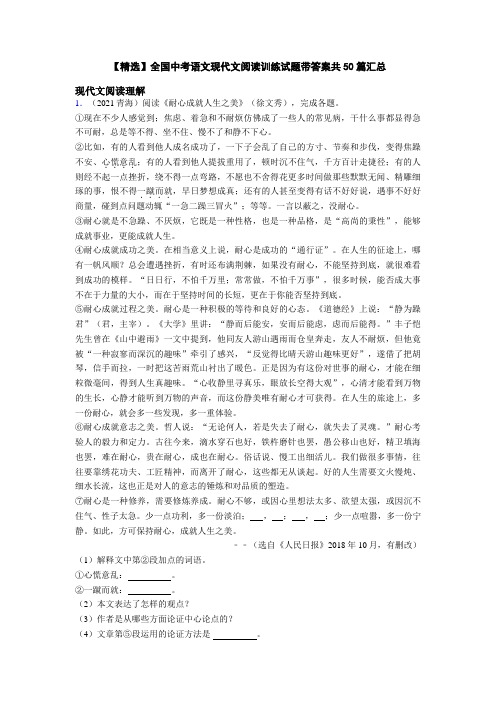
【精选】全国中考语文现代文阅读训练试题带答案共50篇汇总现代文阅读理解1.(2021青海)阅读《耐心成就人生之美》(徐文秀),完成各题。
①现在不少人感觉到;焦虑、着急和不耐烦仿佛成了一些人的常见病,干什么事都显得急不可耐,总是等不得、坐不住、慢不了和静不下心。
②比如,有的人看到他人成名成功了,一下子会乱了自己的方寸、节奏和步伐,变得焦躁不安、心慌意乱....;有的人看到他人提拔重用了,顿时沉不住气,千方百计走捷径;有的人则经不起一点挫折,绕不得一点弯路,不愿也不舍得花更多时间做那些默默无闻、精雕细琢的事,恨不得一蹴而就....,早日梦想成真;还有的人甚至变得有话不好好说,遇事不好好商量,碰到点问题动辄“一急二躁三冒火”;等等。
一言以蔽之,没耐心。
③耐心就是不急躁、不厌烦,它既是一种性格,也是一种品格,是“高尚的秉性”,能够成就事业,更能成就人生。
④耐心成就成功之美。
在相当意义上说,耐心是成功的“通行证”。
在人生的征途上,哪有一帆风顺?总会遭遇挫折,有时还布满荆棘,如果没有耐心,不能坚持到底,就很难看到成功的模样。
“日日行,不怕千万里;常常做,不怕千万事”,很多时候,能否成大事不在于力量的大小,而在于坚持时间的长短,更在于你能否坚持到底。
⑤耐心成就过程之美。
耐心是一种积极的等待和良好的心态。
《道德经》上说:“静为躁君”(君,主宰)。
《大学》里讲:“静而后能安,安而后能虑,虑而后能得。
”丰子恺先生曾在《山中避雨》一文中提到,他同友人游山遇雨而仓皇奔走,友人不耐烦,但他竟被“一种寂寥而深沉的趣味”牵引了感兴,“反觉得比晴天游山趣味更好”,遂借了把胡琴,信手而拉,一时把这苦雨荒山衬出了暖色。
正是因为有这份对世事的耐心,才能在细粒微毫间,得到人生真趣味。
“心收静里寻真乐,眼放长空得大观”,心清才能看到万物的生长,心静才能听到万物的声音,而这份静美唯有耐心才可获得。
在人生的旅途上,多一份耐心,就会多一些发现,多一重体验。
初中语文现代文阅读训练及答案二十篇

初中语文现代文阅读训练与答案一、寂静除夕夜(1)每当___的鞭炮声四起,绚丽夺目的焰火映亮夜空……我就会___地想起20年前的那个除夕夜。
(2)那是“文革”时期,父亲一夜之间被打成“现行反革命分子”。
(3)消息传来,母亲当即昏厥,待醒来已神志不清,语无伦次。
这____的打击个母亲不知所措,她疯了。
(4)和美之家一下子抽去了两根顶梁柱,剩下的,除了一个年过半百的姥姥,就是我们几个未成年的孩子了。
(5)日子的艰难可想而知。
品学兼优的姐姐含泪放弃了学业——很快在小学当上了民办教师,一天可挣得5分工。
尽管如此,家里依然是吃了上顿没下顿。
更痛苦的是,精神失常的母亲还时不时对这个破败之家来个毁灭性的摧残。
她有个怪癖,平日安安静静不言不语,但只要一看见人流泪或听到鞭炮声(后来由她误会成枪声),便歇斯底里地大哭大闹,摔碗,直至声嘶力竭动弹不得。
(6)因此,姥姥常常嘱咐我们,无论如何不能在母亲面前流泪。
(7)春节临近了,按乡村规矩腊月二十三为小年,早放鞭炮敬拜祖先,而除夕夜吃年夜饭放鞭炮则是永年好运的预兆。
早已被折磨得不成人形的姥姥心力交瘁,万般无奈中将我们姐弟叫到跟前,吩咐道:你们出去给家家户户磕磕头、说说好话看能不能过小年不放鞭炮,三十再放,省得你母亲接二连三的发作,我实在是怕了。
(8)于是,姐姐带着我们出发了。
(9)我们居住的院子前后约有九排七八十户人家。
我们从头一排开始,每到一户姐弟四人便一字儿排开,齐齐下跪,告诉她们母亲的病情,乞求他们少放一次鞭炮。
就这样我们不过走了十多户人家人们便一传十,十传百,再后来家家户户都陆续出来人了。
围拢来的乡亲说什么也不让我们下跪,一位年长的大妈抱起我,含泪道:(10)“苦命的孩子,我们都晓得,不用磕头了,我们不放鞭炮,一个也不放。
”(11)我牢记着姥姥的叮嘱,拼命忍住泪水,然而,我却分明看见,围拢来的乡亲们全都流下泪来……(12)小年就这样平静地过去了。
(13)三十那天,吃过晚饭后,姥姥便领着我们着手准备即将面临的灾难。
- 1、下载文档前请自行甄别文档内容的完整性,平台不提供额外的编辑、内容补充、找答案等附加服务。
- 2、"仅部分预览"的文档,不可在线预览部分如存在完整性等问题,可反馈申请退款(可完整预览的文档不适用该条件!)。
- 3、如文档侵犯您的权益,请联系客服反馈,我们会尽快为您处理(人工客服工作时间:9:00-18:30)。
地震与海啸的关系
2011年3月11日下午日本东北地区发生强烈地震后,印尼气象部门随即发出海啸警报,中国国家海洋预报台也表示,这次地震可能会在震中周围数百公里范围内引发区域海啸。
历史上环太平洋地区的大地震往往都能引发大小不一的海啸。
因此每当这个地区出现地震时,各国气象部门都会对海面情况进行严密监测,以确定是否发布海啸警报。
但地震是否一定引起海啸?地震震级越高海啸的破坏力也越大吗?
海啸是一种具有极强破坏力的海浪。
海水剧烈的起伏形成强大的波浪,向前推进。
有时浪高可达数十米。
这种"水墙"内含极大能量,它以极快的速度运动,冲上陆地后会造成巨大破坏。
1960年智利大海啸形成的波涛,就冲击了整个太平洋。
海啸通常由风暴潮、火山喷发、水下坍塌滑坡和海底地震等引发。
其中,海底地震是海啸发生的最主要原因,历史记录显示,特大海啸基本上都是海底地震所引起的。
大多数海底地震发生在太平洋边缘地带,称为"亚延地带"。
海底地震发生后,使边缘地带出现裂缝。
这时部分海底会突然上升或下降。
海水会发生严重颠簸,犹如往水中抛入一块石头一样会产生"圆形波纹",故而引发海啸。
此外,地震海啸的产生还会受海底地震震源断层、震源区水深条件、震级、震源深度等条件影响。
比如,震源位于深水区比浅水区更易产生海啸。
当震源断层表现为错动时,不会产生海啸,而如果震源断层表现为倾滑,就可能引起海啸。
不过,海底地震未必一定就会引发大海啸。
中国地震局提供的统计资料显示,在1.5万次海底构造地震中,大约只有100次引起海啸。
一些专家则认为,引发海啸的地震震级一般在里氏6.5级以上,震源深度在25公里以内。
但即便是强烈地震也不一定就会导致海啸。
如2005年印尼苏门答腊岛附近海域发生8.5级强烈地震,就没有引发大海啸。
专家解释说,这是因为此次地震的震源比较深,所以虽然震级很强,但海底地表上下错动幅度可能也比较小,因此没有形成海啸。
除了与地震震级等相关外,部分专家还表示,海啸的发生与全球气候变化也有关系。
2004年的南亚大海啸发生后,中国国家气候中心有关专家进行相关分析后指出,这场由海底地震引起的大海啸与全球气候变化导致的海平面上升等因素密切相关。
15.第一段文字在文中的作用是什么?(3分)
16.请根据第二段文意,简要解释"海啸"。
(3分)
17.指出下列句子中加点词所指代的内容。
(4分)
①这时部分海底会突然上升或下降。
②专家解释说,这是因为此次地震的震源比较深。
18.指出下列说法的错误,并简述理由。
(4分)
①海啸的形成与地震震级相关,强烈的海底地震一定会导致海啸。
②海啸通常由风暴潮、火山喷发、水下坍塌滑坡和海底地震等引发,与全球气候变化没有多大关系。
阅读理解答案:
15.由新闻事件自然地引出了说明的话题--地震与海啸的关系;引起读者的阅读兴趣。
(3分)
16.海啸是主要由海底地震引发海水剧烈的起伏,形成强大的波浪以极快的速度运动冲上陆地并造成巨大破坏。
(3分)
17.①海底地震发生后,太平洋边缘地带出现裂缝。
(2分)
②苏门答腊岛附近海域发生8.5级强烈地震,却没有引发大海啸。
(2分)
18.①海啸的形成的确与地震震级相关,但强烈的海底地震不一定会导致海啸。
因为海啸的产生还会受海底地震震源断层、震源区水深条件、震源深度等条件影响。
(2分)
②海啸通常由风暴潮、火山喷发、水下坍塌滑坡和海底地震等引发,同时也与全球气候变化有关系。
全球气候变化导致的海平面上升,也会引起海啸。
(2分)。
